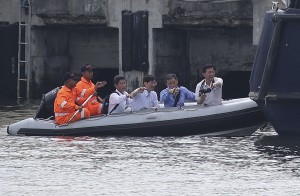PCG men in Balintang Channel shooting seek transfer of trial to Manila

Taiwanese investigators look at a portion of a ship involved in the alleged shooting of a Taiwanese fisherman as they ride a rubber boat with the Philippine Coast Guard on Tuesday May 28, 2013. AP FILE PHOTO
MANILA, Philippines—The Philippine Coast Guard (PCG) personnel criminally charged for the death of Taiwanese fisherman Hung Shih cheng last year after a sea chase and confrontation in Balintang Channel has asked the Supreme Court to transfer the trial of the case from Batanes to Manila.
In an 11-page petition, the Coast Guard personnel said if the trial will be conducted in Batanes, they would be deprived of effective access to the resources, witnesses and evidence they will need for their defense.
Petitioners include Seaman 2nd class (SN2) Nicky Reynold Aurellio, SN1Edrando Quiapo Aguila, SN1 Mhelvyn Aguilar Bendo III, Police Officer 2 Richard Fernandez Corpuz, SN1 Andy Gibb Ronario Golfo, SN1 Sunny Galang Masangkay and SN1 Henry Baco Solomon. They were charged in court with Commanding Officer Arnold Enriquez de la Cruz for the fatal shooting of the Taiwanese fisherman.
They explained that they are all based in Port Area, Manila, the office of the Philippine Coast Guard and the incident happened in the performance of their duty.
There was also an ill will between the PCG and members of the Bureau of Fisheries and Aquatic Resources who are based in Region 2 after they were mentioned as those who coaxed them to tamper some of the evidence that led to the filing of an obstruction of justice case.
“Hence to require all petitioners, as well as their witnesses and evidence, to move from Metro Manila to Batanes for each and every hearing of the criminal case would be a tremendous expenditure of time, resources and manpower, not to mention finances which petitioners, as low-ranking civil servants, have little of,” the petition filed by their lawyer, Rodrigo Moreno said.
They added that with the distance involved, it would prevent them from “gathering, marshalling and properly presenting their evidence in the case or even attending the hearings.”
“This is because petitioners’ witnesses will be reluctant or perhaps even unwilling to travel to Batanes unless they are compensated for their time and travel and lodging expenses, which petitioners cannot afford,” they said.
They added that even the government would also spend a considerable amount of money because they will bear the expenses of their witnesses and evidence.
Among the witnesses the government are going to present during the trial include other crew members – two Taiwanese fishermen and their Indonesian colleague – of the Taiwanese fishing vessel Guang Da Xing 28 whom they explained will fly in from their respective countries to Manila and then go to Batanes when they are set to take the witness stand.
“The expenses involved in these logistical requirements are beyond petitioners’ reach. Hence, should petitioners for example decide to call as their witnesses some or all of the crew of the offending vessel, petitioners will be obligated to answer for their board, lodging, transportation, and meals, insofar as travel to Batanes is concerned,” they added.
“Further, petitioners as well as their witnesses will be under the threat of physical harm or even deaths, or at the very least some form of harassment, every time they attend the hearing of the case given the intense ill will that exists between them and other parties. This is especially true considering that one such party is a sovereign nation with a considerable military force located nearby. Hence, even if petitioners can bring their evidence and witnesses to Batanes, they will be unable to effectively and properly present them,” they further said.
Given all these circumstances, the petitioners said continuing the trial to be held in Batanes may result in miscarriage of justice.
They said that aside from previous cases in which the High Court has ordered a transfer of venue of the trial of a criminal case, the Constitution, particularly Section 5 (4), Article VIII, also allows a change in venue if there are “ serious and weighty reasons present” to ensure that justice is fully met.
“Indeed, having the trial of the criminal case heard in any court within Metro Manila would result in a just, speedy, and inexpensive determination of the same as opposed to trial conducted in Batanes,” they said.
The case stemmed when the PCG personnel on board a vessel of the BFAR patrolling off the coast of Balintang Channel intercepted the Taiwanese fishing vessel allegedly poaching inside Philippine territory.
After a brief sea chase, they fired at the fishing vessel, killing the Taiwanese fisherman.
In recommending the filing of the charges, the Department of Justice dismissed the claim of the respondents that they were forced to fire at the Taiwanese fishing vessel after it tried to ram the BFAR ship.
The DOJ also said they found no evidence to indicate or to prove that the Taiwanese fishing vessel posed an imminent or grave danger to the respondents before and during the pursuit.
The DOJ panel also said the claim of self-defense by the respondents should be better left threshed out in the trial court, during a full-blown hearing.
The incident sparked tension between the Philippines and Taiwan.
RELATED STORIES
Coast Guard insists it was not liable for death of Taiwanese